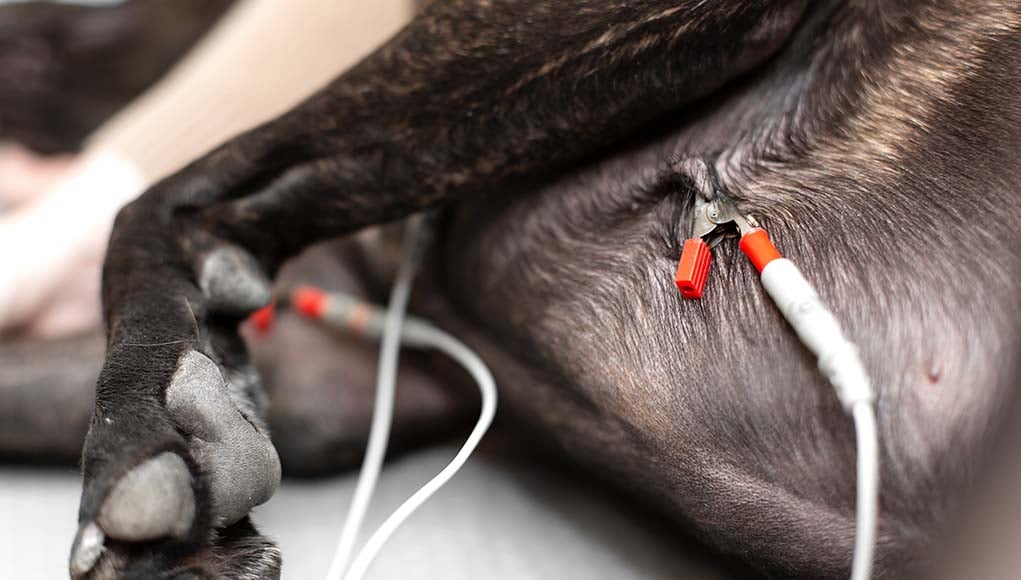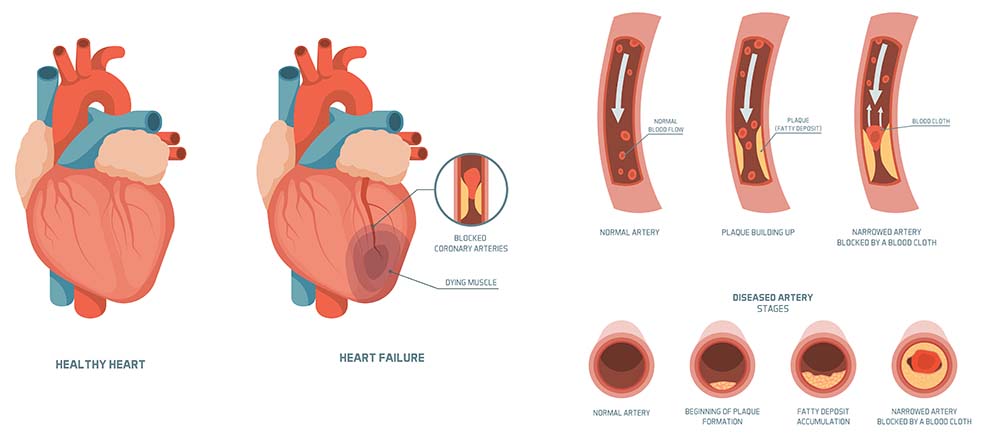It may come as a surprise to some, but dogs can suffer from heart attacks similar to humans. A dog heart attack can cause permanent damage to them, or even death due to the lasting and/or initial effects. Heart attacks in dogs are caused by lifestyle, health, and the genetic makeup. They can also be prevented by making changes in the dog’s daily habits or lifestyle. Prevention relies heavily on looking for warning signs and other symptoms that have the possibility of leading to a full-blown heart attack in a dog (1).
What is a Dog Heart Attack?
A dog heart attack, also known as a myocardial infarction, is a condition that occurs when the animal's blood is unable to reach the muscles of their heart. Most often, it's caused by the blood flow being restricted, or blocked, from the heart’s muscular wall. The blockage can be caused by the formation of a blood clot within the blood vessels of the heart.
When a dog's heart is deprived of blood, it's not able to receive the necessary oxygen or nutrients. As a result, the heart muscle begins to die. This affects how effectively the dog’s heart can pump and move the blood throughout their body. Heart attacks in dogs are not common (2, 3) but they can happen to any canine of any breed or gender (4).
Dog heart attacks do not usually remain undetected, but the timing of when it is noticed depends on how familiar an owner is with symptoms and signs. It is common for owners to be hesitant in identifying symptoms as it is not a frequent occurrence in dogs. Luckily, for anyone wanting to know how to prevent a dog heart attack, this condition can be predicted (in some cases) by recognizing the problem behaviors and developing symptoms over a small period of time (1).
Dog Heart Attack Symptoms
The actual symptoms of a heart attack in a dog can be hidden if the owner is unfamiliar and may be dismissed due to inexperience. There are multiple warning signs of an impending myocardial infraction, but the most noticeable symptoms is that the dog will usually collapse and become generally unresponsive (5).
Other symptoms may include:
- Fever
- Panting
- Increase heart rate
- Anxiety
- Lethargy
- Confusion
- Seizures
- Pain in front legs
- Difficult standing
- Immobility
- Vomiting
- Weakness
- Obesity
- Lameness
- Difficulty breathing
Most of the symptoms, if undetected, may worsen and cause or lead to sudden death. All dogs will not experience the same symptoms, but most will experience multiple. When witnessing the dog experiencing multiple symptoms from the list, it is safe to assume that they may be getting a heart attack and require immediate medical attention.
Symptoms are not the only telltale signs of a heart attack in a dog (6). Heart attacks frequently build up over time and create a hostile environment for the dog’s heart and body. These symptoms may also show up over time and should be noticed and kept up with to ensure that the dog is in their healthiest state rather than allowing their health to further deteriorate.
Risk Factors
Heart attacks in dogs do not usually develop out of the blue and are often caused by these three primary reasons (6):
- genetic predisposition
- congenital abnormalities
- heart disease
These are not the only risk factors that can lead to a dog heart attack; they are simply the most common. Other medical issues can lead to a heart attack in a dog, so it's essential for owners to speak to a vet about pre-existing conditions or conditions their pet may be at risk for and if those conditions can lead to a heart attack down the line.
Genetic Predisposition
The genetic predisposition does not necessarily refer to the breed type or purebred versus mutt. It relies heavily on the genetics passed down from the parents to the puppies. If one of the parents have previously experienced a heart attack, or have had a littermate that has experienced a heart attack, then they and their puppy are more likely to get one as well sometime in their lifetime (7).
Congenital Abnormalities
Although similar in idea, congenital abnormalities can be developed or passed down through generations of dogs (8, 9). This is where breed type comes in. There are many different breeds that are predisposed to developing or having congenital abnormalities.
The breeds that commonly experience such defects include:
- Cavalier King Charles Spaniels
- Boxers
- Great Danes
- Afghan Hound
- American Cocker Spaniel
- Bulldogs
- Dalmatians
- Doberman Pinscher
- Irish Wolfhound
- Newfoundland
- Saint Bernard
- Scottish Deerhound
Mixed breed dogs are also at a higher risk of having a congenital heart problem. There are no certain breeds that when combined, cause these problems. For a general idea, look up what breeds the dog looks most like and getting a guess based on their findings.
Heart Disease
Heart disease in dogs is the third most common cause of a dog heart attack (6, 10). As heart disease progresses, it can lead to congestive heart failure (CHF), which happens when the heart cannot keep up with the body’s demands. This can lead to an increased risk of a heart attack.
Learning to recognize the symptoms of heart disease can quickly reduce the chances of their dog having a heart attack and it's the best way for anyone wanting to know how to prevent a dog heart attack effectively (11, 12).
Common symptoms of heart disease in dogs include:
- Heavy breathing
- Issues with exercising or physical activity
- Unexpected behavioral changes
- Difficulty breathing
- Coughing
- Loss of appetite
- Increase in appetite (rare)
- Fainting
- Weakness
- Restlessness
- Self-isolation
- Blue gums
- Constipation
- Sensitive stomach
- Diarrhea
- Edema
- Vomiting
If the dog seems to be experiencing one or more of these symptoms, it is essential that they are taken to the vet as soon as possible. Receiving treatment for heart disease or any other underlying issue that may be causing these symptoms can quickly identify and prevent a possible upcoming heart attack in a dog.
How to Prevent a Dog Heart Attack
 Most heart attacks in dogs can be prevented if the proper measures are taken. The biggest key in preventing a dog heart attack relies on the identification of at-risk factors and reducing their impact on the pet. These can be health concerns or lifestyle concerns.
Most heart attacks in dogs can be prevented if the proper measures are taken. The biggest key in preventing a dog heart attack relies on the identification of at-risk factors and reducing their impact on the pet. These can be health concerns or lifestyle concerns.
Managing a proper diet is very useful and helpful in an attempt to prevent heart attacks. First, it's the common sense that dogs should not be fed too much processed fatty foods, carbs, salt, or kibble with fillers, artificial additives, etc. The problem, however, mostly consists of owners feeding dogs human food and table scraps. Some human food is easily digestible for dogs, but others contain too much fat and sodium, like fried chicken or fast food.
Studies have found that alternations in fatty acids may help to prevent heart attacks in dogs and generally improve a dog's heart health (13). Therefore, when it comes to fats in a dog's diet, healthy ones are actually helpful in keeping a pet's heart strong. A good balance between omega-3s and omega-6s is key. Further research into feeding oily fish to dogs or using fish oil supplements instead (omega-3s with EPA/DHA) found that when given in right amount, this can significantly and positively affect a dog's heart, potentially preventing a heart attack in the future (14, 15, 16, 17).
Next is a consistent and healthy dog training, workout and/or playtime regimen. It's helpful as it increases blood flow and prevents fats from building in the dog. Dogs should be walked frequently throughout the day, allowed to play multiple times a week, and even better if this can be accomplished throughout the day as well. It may be harder to keep older dogs active, which is why regular short walks can greatly benefit their health.
Identification of existing conditions is detrimental to the prevention of heart attacks. As an owner, you should be familiar with any and all problems that could develop into heart disease or a heart attack. Regular vet visits and at home regulation of symptoms are required to ensure that their conditions are being properly monitored and maintained. If the conditions seem to worsen, ask the vet about steps that can be taken to reverse the condition deteriorating.
Best Dog Food for Heart Health
Unless your dog is predisposed to heart problems, it's unlikely you need to worry about a special diet. Discuss this with a veterinarian, and if it's decided that your pooch is at a higher than average risk for a heart attack, given how salt intake directly affects a dog's heart, the vet may recommend a low sodium dog food brand.
What to Do if a Dog is Having a Heart Attack?
If your dog seems to be experiencing any of the symptoms, and you believe they may be having a heart attack, you need to seek immediate medical attention. The vet will instruct you on exactly what you should do and what method of transportation is best for the dog. Once at the vet, they will determine whether a heart attack is a mild heart attack or a serious one.
If the vet believes the dog is experiencing a mild heart attack, they will begin by checking their vital signs. The vet will listen to the dog’s heart for an abnormal rhythm or fluctuating heartbeat and will draw blood. The blood will allow them to identify any biomarkers that may show the presence of heart disease.
As soon as the underlying cause of the dog's heart attack has been identified, the vet will take action and stabilize the dog’s condition. Any accumulated fluid will be removed from the dog’s lungs, and medication will be prescribed. The medicine is required to prevent another possible heart attack from occurring.
If the vet believes that the dog is suffering from a serious heart attack, one that can result in either a collapse or in sudden death, CPR will be performed. After the dog’s condition has become relatively stable, your veterinarian will continue treatment as if it were a mild heart attack, although the recovery may be harder and take longer.
It's About Having a Plan of Action
Ultimately, understanding what may cause a heart attack is the best way to plan for treatment for anyone wanting to know how to prevent a dog heart attack. If you believe your pooch is at risk, have a plan of action in place to identify the symptoms and signs.
Most importantly, talk with your veterinarian to make sure that you are both on the same page. They need to be informed whenever the dog’s condition changes so that the plan can be altered.
References:
- Pflugfelder PW, et al. Early detection of canine myocardial infarction by magnetic resonance imaging in vivo. Circulation. 1985 Mar;71(3):587-94.
- Kidd L, et al. Clinical findings and coronary artery disease in dogs and cats with acute and subacute myocardial necrosis: 28 cases. J Am Anim Hosp Assoc. 2000 May-Jun;36(3):199-208.
- Driehuys S, et al. Myocardial infarction in dogs and cats: 37 cases (1985-1994). J Am Vet Med Assoc. 1998 Nov 15;213(10):1444-8.
- Verdouw PD, et al. Animal models in the study of myocardial ischaemia and ischaemic syndromes. Cardiovasc Res. 1998 Jul;39(1):121-35.
- Janus I, Noszczyk-Nowak A, Nowak M, et al. Myocarditis in dogs: etiology, clinical and histopathological features (11 cases: 2007-2013). Ir Vet J. 2014;67(1):28. Published 2014 Dec 24. doi:10.1186/s13620-014-0028-8
- Beaumier A, Rush JE, Yang VK, Freeman LM. Clinical findings and survival time in dogs with advanced heart failure. J Vet Intern Med. 2018;32(3):944–950. doi:10.1111/jvim.15126
- Lój M, et al. Genomic and genetic aspects of heart failure in dogs – a review. Acta Vet Hung. 2012 Mar;60(1):17-26. doi: 10.1556/AVet.2012.002.
- Parker HG, Meurs KM, Ostrander EA. Finding cardiovascular disease genes in the dog. J Vet Cardiol. 2006;8(2):115–127. doi:10.1016/j.jvc.2006.04.002
- Meurs KM, et al. Genetics of cardiac disease in the small animal patient. Vet Clin North Am Small Anim Pract. 2010 Jul;40(4):701-15. doi: 10.1016/j.cvsm.2010.03.006.
- Domanjko Petrič A, Lukman T, Verk B, Nemec Svete A. Systemic inflammation in dogs with advanced-stage heart failure. Acta Vet Scand. 2018;60(1):20. Published 2018 Mar 24. doi:10.1186/s13028-018-0372-x
- Atkins C, et al. Guidelines for the diagnosis and treatment of canine chronic valvular heart disease. J Vet Intern Med. 2009 Nov-Dec;23(6):1142-50. doi: 10.1111/j.1939-1676.2009.0392.x. Epub 2009 Sep 22.
- Borgarelli M, et al. Historical review, epidemiology and natural history of degenerative mitral valve disease. J Vet Cardiol. 2012 Mar;14(1):93-101. doi: 10.1016/j.jvc.2012.01.011. Epub 2012 Mar 3.
- Freeman LM, et al. Nutritional alterations and the effect of fish oil supplementation in dogs with heart failure. J Vet Intern Med. 1998 Nov-Dec;12(6):440-8.
- Smith CE, et al. Omega-3 fatty acids in Boxer dogs with arrhythmogenic right ventricular cardiomyopathy. J Vet Intern Med. 2007 Mar-Apr;21(2):265-73.
- Sagols E, Priymenko N. Oxidative stress in dog with heart failure: the role of dietary Fatty acids and antioxidants. Vet Med Int. 2011;2011:180206. Published 2011 Apr 6. doi:10.4061/2011/180206
- Freeman LM, et al. Beneficial effects of omega-3 fatty acids in cardiovascular disease. J Small Anim Pract. 2010 Sep;51(9):462-70. doi: 10.1111/j.1748-5827.2010.00968.x. Epub 2010 Jul 29.
- Billman GE, Nishijima Y, Belevych AE, et al. Effects of dietary omega-3 fatty acids on ventricular function in dogs with healed myocardial infarctions: in vivo and in vitro studies. Am J Physiol Heart Circ Physiol. 2010;298(4):H1219–H1228. doi:10.1152/ajpheart.01065.2009














